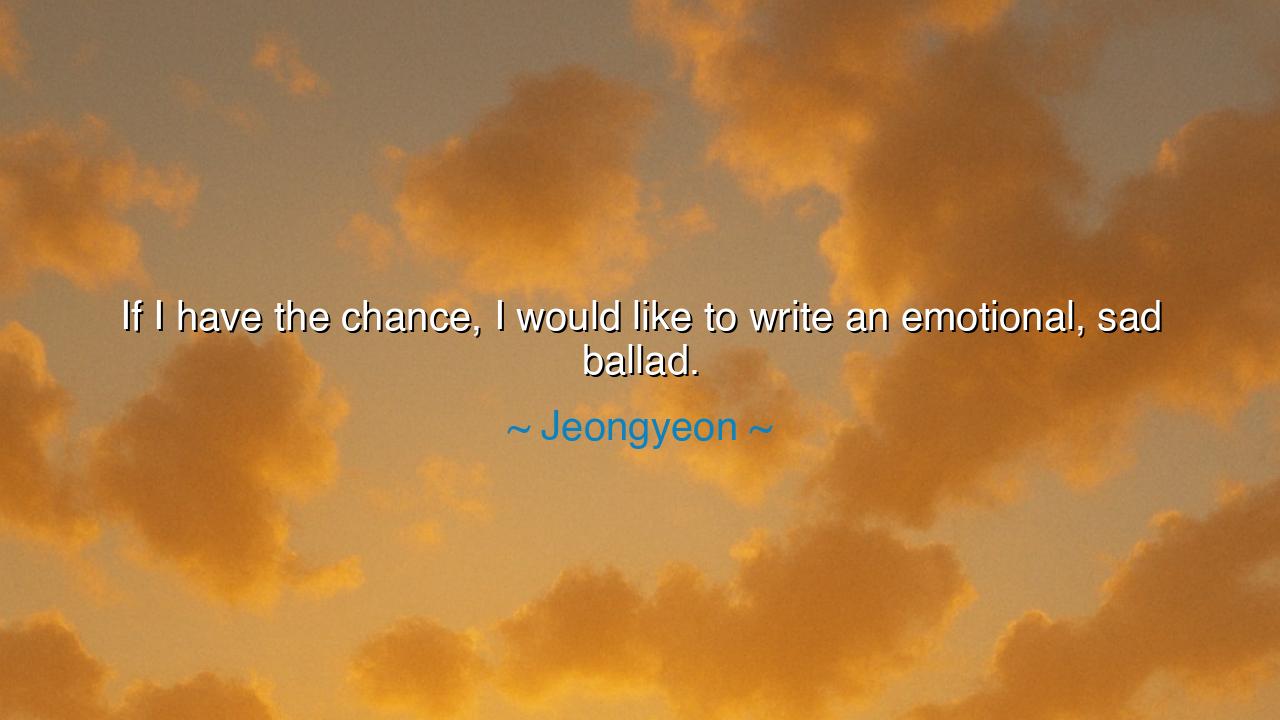
If I have the chance, I would like to write an emotional, sad






In the heart of every soul, there exists a yearning to express the deepest emotions that shape our existence. Jeongyeon’s words—“If I have the chance, I would like to write an emotional, sad ballad”—speak to this very human truth. Her longing is not for fame or applause, but for the opportunity to capture the sorrow and fragility of life through song. A ballad, in its purest form, is not merely a tune; it is the voice of a heart laid bare, a way to connect with others through shared pain and universal experience. Through the lens of this desire, we see that music, much like storytelling, has the power to bridge distances, to unite those who may never meet in person but share a common thread of human emotion.
The beauty of a sad ballad is in its simplicity—it strips away pretense, leaving only raw emotion. Jeongyeon’s wish to create such a song reflects a deep understanding of art’s transformative power. A ballad is not just a sad story, but a vessel that carries the listener into the depths of sorrow, where they can find solace in the fact that they are not alone. The most poignant songs, often the ones that endure through the ages, are those that express the agony of loss, of longing, of the quiet sorrow that many of us carry with us. These are the songs that speak to our souls, for they acknowledge the pain we all experience as part of the human condition.
Consider the greats of history—the poets, musicians, and artists whose works have transcended time. Beethoven, with his hauntingly beautiful "Moonlight Sonata," composed during his own battle with deafness, created music that spoke directly to the sorrow within us all. Or take Sylvia Plath, whose deeply emotional poetry explored the darker aspects of the human mind and spirit. These artists understood that sorrow is not something to be avoided or ignored but something to be faced, to be lived with, and eventually, to be transformed into art. Jeongyeon’s desire to write a sad ballad, then, is not merely a personal wish—it is a reflection of the timeless tradition of artists who have found catharsis and connection through their creative expressions.
The sad ballad speaks to the human experience in its most vulnerable form. It captures the moments when we are overwhelmed, when we are no longer in control, and when our hearts are heavy with grief. Yet, through this exploration of darkness, we find light. A song that begins with sorrow can end in healing, for by acknowledging pain, we give ourselves the chance to move beyond it. This is the power of music, of art—to help us confront and transcend the sadness that is often part of life’s journey. Jeongyeon’s words remind us that it is okay to feel, to experience sadness, and to allow that emotion to fuel something beautiful and meaningful.
In Jeongyeon’s longing, we also see a reflection of our own unspoken desires. How many of us long to give voice to our emotions, to share our struggles, and to find a way to process the complexities of life? Her words invite us to reflect on our own hearts: What do we long to express? Whether it is through music, writing, art, or simply in conversation, there is a deep human need to share our feelings with others, to seek connection through shared vulnerability. The ballad, in its sadness, becomes a bridge, not a wall, uniting people in their common sorrow.
From these reflections, we take the lesson that art, especially the art of a sad ballad, is a tool for healing and connection. It is a way to embrace our emotions, not to shy away from them. As we journey through life, we will undoubtedly face moments of sorrow, but we must remember that in those moments, there is also an opportunity for growth and understanding. Whether through a song, a poem, or a simple gesture, we can find ways to express the deepest parts of ourselves. The call to action here is simple: do not shy away from your feelings, for in the very expression of sorrow, you may find the path to healing. And as Jeongyeon has reminded us, sometimes, it is the sad songs that resonate most deeply with the soul, offering comfort and solace to those who listen.






AAdministratorAdministrator
Welcome, honored guests. Please leave a comment, we will respond soon